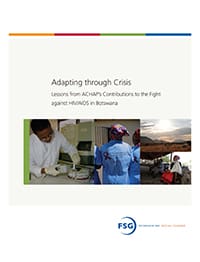A review of the successes and challenges of the African Comprehensive HIV/AIDS Partnerships (ACHAP), an unprecedented coalition formed in 2000 by the Bill & Melinda Gates Foundation, Merck and Co, Inc., The Merck Foundation, and the Government of Botswana to address the HIV/AIDS epidemic that was ravaging the country.
Top Takeaways
- ACHAP broke new ground in proving the feasibility of HIV treatment in sub-Saharan Africa. The successes of Botswana emboldened the global AIDS response, shifting the dialogue to emphasize aggressive targets for treatment scale-up.
- ACHAP’s contributions to the HIV response need to be assessed in the context of the changing environment; the key lessons from the public-private partnership are around how the organization successfully adapted—or failed to adapt—as the epidemiological, political, HIV/AIDS knowledge, and stakeholder contexts change.
- ACHAP offers cautionary tales for other public-private partnerships. It underinvested in learning and evaluation, insufficiently navigated the changing political context in Botswana, and belatedly planned for the sustainability of the partnership.

